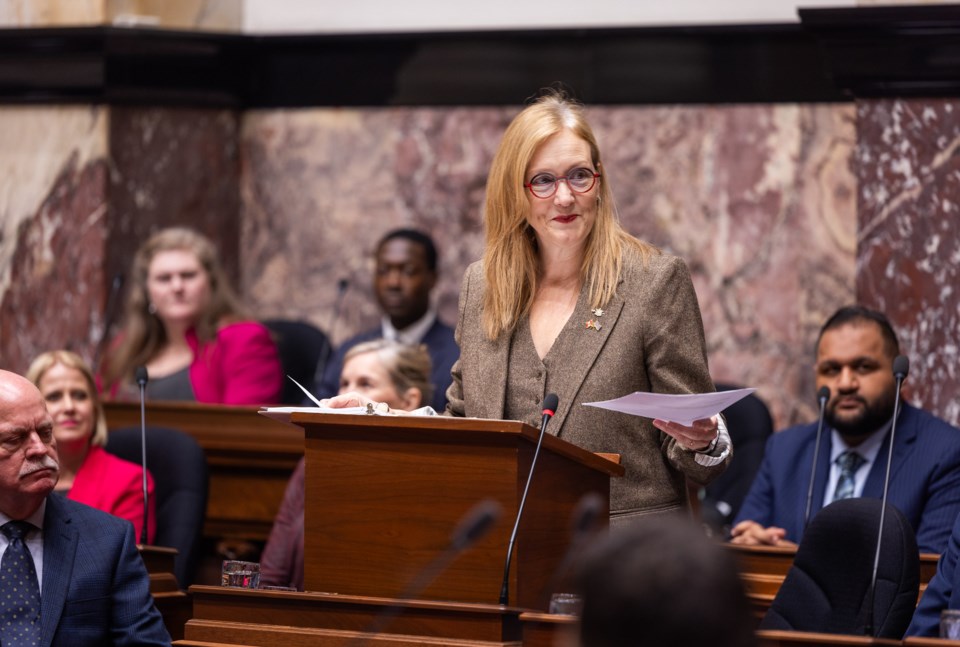When B.C.’s finance minister tabled a budget last month with record-breaking deficit and debt levels, she was asked if the sea of red ink drowning her fiscal plan would lead to a downgrade in the province’s credit levels.
“I won't make a guess on credit rating,” Brenda Bailey told the budget audience March 4. “But what I will say is that we are working closely with the credit rating agencies.”
Not closely enough, it would appear, as two of the biggest agencies boomeranged back this week with strong denunciations of the NDP government’s lack of fiscal discipline.
“The increase in deficits and rising debt largely stems from provincial policy choices, which we view as evidence of a continued weakening in governance and fiscal and debt management, from high standings,” wrote Moody’s Ratings, which chopped B.C. down from an aa1 to aa2 rating.
“We view this as a notable departure from the province's historical approach of budgeting that focused on limiting the growth in debt or protecting its fiscal position,” Moody’s said. “The lack of clarity by the government on a path back to balance further weakens fiscal management.”
S&P Global had similar concerns:
"We believe that the province's commitment to fiscal discipline and stability has wavered in recent years as B.C. has materially increased its spending for both operations and capital investment to unparalleled level,” wrote S&P, which dropped its rating from AA- to A+, marking the fourth downgrade in four years for the province.
The downgrades make it more expensive for the B.C. government to borrow to build projects like roads, hospitals and bridges. The province already spends more annually ($5 billion) on debt servicing costs than it does on its entire child welfare system.
Both rating agencies had a common complaint: B.C. had run deficits the previous two years, and now was projecting three more years, with no end in sight and not even a semblance of a plan to cut spending or get back to balance.
Bailey, though, seemed hesitant to accept the critique. She attempted to blame the international uncertainty caused by American tariffs.
The ratings agencies did make reference to tariffs in their reports, but squarely and firmly laid the rationale for the downgrade at the feet of the NDP government’s spending choices.
The downplaying exercise continued into question period.
“We have gone from surplus and stable credit ratings under Premier [John] Horgan to record deficits and four credit downgrades, all under the watch of this premier,” said Opposition BC Conservative finance critic Peter Milobar.
“This in spite of the fact that there are record revenues coming to government on the backs of British Columbia taxpayers. A simple question to the premier: How high is an acceptable deficit for this government to tolerate?”
Bailey tried to dodge.
“It's so important that we get back on a road to balance,” the finance minister said. “But I want to point out to the member opposite that there is more than one kind of deficit. We inherited an incredible deficit in services and in infrastructure. We’ve been addressing that for British Columbians, and we’ll continue to do so.”
Milobar, as he’d done all week in the legislature on the carbon tax and other matters, got the better of the minister in the exchange.
“This premier inherited a $6 billion surplus,” he retorted, accurately describing the financial situation Premier David Eby was gifted by Horgan in 2022. The coming year’s $11 billion deficit is a more than $17 billion swing in fortunes within three years, all under the Eby administration.
The premier, for his part, seemed more willing to acknowledge the reality of the situation.
“I've noted the concerns of these credit rating agencies, which are concerns that I share,” Eby said Thursday.
“We have a significant deficit. We have committed to protect frontline services for British Columbians, to build hospitals, to build schools. We're doing that work. We need that to be strong in British Columbia, and also we need a path to return to balance.
“That's why the finance minister has been doing the work.”
Bailey has promised a cost-cutting and efficiency review, alongside a hiring freeze, to save money. The reviews have no defined scope or timeline, and the hiring freeze is already a Swiss cheese of exemptions.
Together, Bailey estimates the initiatives will save $300 million this year. That’s 0.3 per cent of overall spending — a sum bordering on irrelevant, and, in the case of the ratings agencies, basically equivalent to having no plan at all.
In other news
• U.S. President Donald Trump has mistaken tariffs for economic salvation, .
• B.C.’s response to the new global tariffs by the Trump administration is guarded and confused so far, . Meanwhile, B.C. car buyers could soon be .
• The Business Council of B.C. on the province’s difficult financial situation.
Rob Shaw has spent more than 17 years covering B.C. politics, now reporting for CHEK News and writing for Glacier Media. He is the co-author of the national bestselling book A Matter of Confidence, host of the weekly podcast Political Capital, and a regular guest on CBC Radio.
馃毃New newsletter alert! Stay ahead of the curve in B.C. politics. Get expert political analysis delivered straight to your inbox, plus inside scoops and other stories from across the province.





